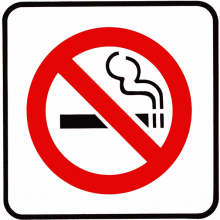
Yesterday was the Great American Smokeout. A national day for quitting for all ages. Of course quitting smoking, even for a day, is an awesome step forward for health. Clearly finger-wagging and guilt-tripping really don't help smokers quit. I remember as a child lying on the floor when around a family member who was smoking saying, "Smoke rises... I'll stay down here." Fairly ineffective, I'm certain. Anecdotally, the family member is still a smoker. Nicotine is really addictive.
Cigarette smoking remains the number one cause of preventable death and premature birth in this country. And the risk of cigarette-related health problems start with the very first cigarette. That being said, recently I was talking with a colleague about her exposure to second-hand smoke as a child. She was joking that it was either all the diet soda she was drinking or her exposures to her parents' smoking in the car that would kill her.
I got to tell her the great news. Health benefits for smokers who quit start almost immediately. Don't underestimate the joy children exposed to second-hand smoke get when the air clears.
Benefits Of Quitting:
Health benefits to a smoker and their family start immediately. Not just the cosmetic benefits (smoking is kind of ugly) and olfactory ones (smoking stinks). Within 20 minutes of quitting heart rate and blood pressure drop. In the first day after quitting a smoker's carbon monoxide level in blood returns to normal and within weeks to months their lung function improves. For smokers it only takes a few months for coughing and shortness of breath to improve as well. There is great reward if smokers can get support to decrease their craving and addiction to nicotine to succeed in quitting. Other astounding benefits from American Cancer Society:
- 1 Year After Quitting: the risk of heart disease is ½ that of someone who keeps on smoking.
If you or someone you know if thinking of quitting, I suggest framing the opportunity positively. Even posting one of the above factoids on your Facebook page today may help encourage a smoker to seek support. Secondhand smoke can also be a huge motivator:
- Smoking while pregnant increases the risk of SIDS for babies. Infants who live in homes with smokers also have higher rates of SIDS.
- Babies lungs are more fragile and developing: do not allow anyone to smoke near your child, especially your infant.
- In The Car: Do not smoke or allow others to smoke in your home or car. Opening a window does not protect your children from smoke.
- At school: Use a smoke-free day care center.
- Inside: Do not take your child to restaurants or other indoor public places that allow smoking. This is easier and easier as states adopt indoor smoking laws.
- Out & About: Teach children to stay away from secondhand smoke.